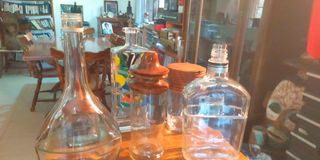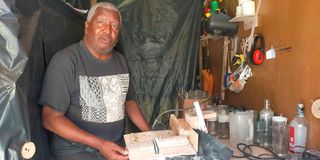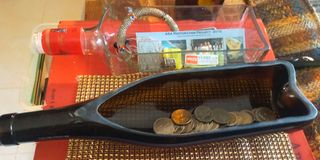From waste to wealth: Turning discarded glass, plastics into eco-friendly artistic products

Assorted bottles made from recycled glass displayed in Herman Muli's home in Athi River on March 7, 2025.
What you need to know:
- Each Kenyan generates approximately half a kilogramme of waste daily—translating to 22 tonnes of waste generated per day and a staggering eight million tons annually.
In an unassuming room in Mlolongo, Machakos County, the rhythmic sound of glass cutting slices through the air as discarded bottles undergo an extraordinary transformation. What was once environmental waste destined for landfills is reborn as elegant drinking glasses, ornate light fixtures, and decorative pieces—all under the watchful eye of 74-year-old Herman Muli.

Herman Muli showcases assorted products made from recycled glass and plastic bottles at his home in Athi River.
"Every glass or plastic bottle can be transformed into something beautiful and useful," says Mr Muli, standing amid hundreds of his creations in his Sabaki Tamarind Meadows Estate maisonette, which now doubles as a showroom for his environmental enterprise.
Mr Muli's Tosheka Products Company represents a bold response to one of Kenya's most visible environmental challenges. While government agencies struggle with waste management, this entreprenuer is demonstrating how individual innovation can tackle pollution while creating economic opportunities.
The environmental imperative
According to the National Environmental Management Authority (Nema), each Kenyan generates approximately half a kilogramme of waste daily—translating to 22 tonnes of waste generated per day and a staggering eight million tons annually. In Nairobi alone, an estimated 2,400 tonnes of solid waste, including glass and plastic bottles, accumulate every day.

Products made from discarded plastics and glass.
More alarming is that only 70 per cent of that waste is collected, with the United Nations Environment Program reporting that merely 10 per cent reaches designated disposal sites. The rest litters streets, clogs waterways, and pollutes natural habitats.
This environmental crisis caught Mr Muli's attention upon his return to Kenya in 2014 after three decades in the United States.
"I was shocked by the volume of used bottles and plastics strewn everywhere in major towns. Sometimes broken glass would create hazards for pedestrians and wildlife. I saw not just an environmental problem but an opportunity."
From concept to creation
After months of intensive research, Mr Muli launched his eco-friendly glass and plastic upcycling venture in September 2024, moving to full production by December. With an initial investment of just Sh60,000—excluding his Sh16,000 monthly rent for a single-room production center in Mlolongo township—he began collecting discarded bottles from the area's numerous nightspots.
"Mlolongo's dozens of nightlife venues capture Nairobi's population tastes and leave an environmental footprint in their wake," explains John Mwangi, the production center manager at the company. "What most see as morning-after trash, we see as raw material."
The production process is surprisingly straightforward yet requires precision. First, bottles are thoroughly washed to remove impurities and labels. Then, using a custom-built glass cutter designed by Mr Muli himself, the bottles are carefully sliced into the desired shapes. A rotating smoothening machine—also assembled by Mr Muli—removes sharp edges before the pieces undergo final design enhancements.
"One of our core principles is minimal waste," Mr Mwangi emphasises. "We use almost every part of the bottle in some capacity."
Artistry meets sustainability
What makes Tosheka Products stand out is not just their environmental mission but the artistic quality of their creations. Mr Muli doesn't merely recycle glass—he reimagines it.
The product range is impressive: juice and water glasses, champagne flutes, flower vases, food serving containers, and utility holders. Perhaps most striking are the lighting fixtures—including chandeliers—enhanced with beads and intricate designs that belie their humble origins.
Glass products range from Sh800 to Sh1,800 per item, while the lighting fixtures fetch between Sh6,000 and Sh8,000 per unit. Despite being made from discarded materials, Mr Muli insists his products are of higher quality than many factory-produced alternatives in the market.
"We are not just recycling; we're upcycling," he says, explaining the difference. "We are adding value and creating products that are sometimes more durable and certainly more unique than mass-produced items."
The production center, though modest, now employs four permanent staff, five part-time casuals, and two online marketing executives. At full capacity, they produce approximately 800 pieces weekly, serving restaurants, institutions, offices, and homeowners.
Challenges of eco-entrepreneurship
Despite the environmental and economic promise, the venture faces significant challenges. Chief among them is market penetration.
"Introducing a new product, especially one made from what people consider waste, requires an astute marketer. Out of 60 marketing applicants I've interviewed in the last two months, only two were equal to the task,” says Mr Muli.
The lighting shades, particularly those made from plastic bottles, have been the hardest to introduce to Kenyan consumers. "It's taking baby steps in the market," Mr Muli acknowledges, "but we're slowly cutting a niche."
Another challenge is the inconsistent supply of suitable bottles. While Mlolongo generates substantial waste, not all discarded bottles meet the quality requirements for upcycling. This has prompted Mr Muli to establish networks with local bars and restaurants for direct collection.
Broader impact
Beyond the immediate business objectives, Mr Muli envisions his venture as a model for environmental entrepreneurship across Kenya. By demonstrating how waste can generate income and employment, he hopes to inspire similar initiatives in other communities.
"My idea was to enhance opportunities for mass employment through waste eco-friendly alternatives. This model can be replicated anywhere there's glass and plastic waste—which, unfortunately, is everywhere in Kenya."
Environmental experts note that such small-scale recycling operations, while not solving the entire waste management crisis, play a crucial role in changing attitudes toward waste.
Additionally, Tosheka Products offers environmental benefits beyond waste reduction. By upcycling glass locally, the operation eliminates the substantial energy typically required for industrial glass recycling—a process that involves melting glass at extremely high temperatures.
Future prospects
Looking ahead, Mr Muli plans to expand both production capacity and product range. He's currently developing techniques to transform plastic bottles into durable furniture components and decorative household items.
"Plastic is perhaps even more environmentally damaging than glass, so finding creative ways to repurpose it is essential," he says.
He also hopes to establish training programmes for youth and women's groups, teaching them glass and plastic upcycling techniques they can use to start their own micro-enterprises.
"This isn't just about my business; it's about creating a new way of thinking about waste. Every bottle we transform represents one less piece of pollution in our environment and one more opportunity for income generation."
As Kenya continues to grapple with its waste management challenges, innovators like Mr Muli demonstrate that environmental solutions don't always require large-scale infrastructure or government intervention. Sometimes, they begin with one person seeing value where others see only trash.
Standing in his living room-turned-gallery, surrounded by gleaming glasses and luminous lampshades that once languished as litter, Mr Muli embodies a hopeful approach to environmental entrepreneurship—proving that with creativity and determination, Kenya's waste crisis could become an opportunity for ecological and economic renewal.


